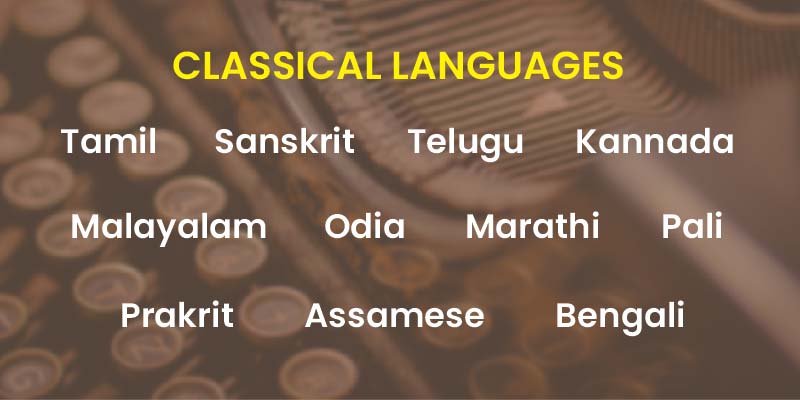- India
- Dec 17
What are classical languages?
• There is no proposal currently under consideration to declare Maithili and Magadhi as classical languages, Union Culture Minister Gajendra Singh Shekhawat said in the Lok Sabha on December 16.
• In October, the Union Cabinet approved to confer the status of classical language to Marathi, Pali, Prakrit, Assamese and Bengali languages.
• As per the procedure established for declaring a language as a classical language, a detailed proposal with recommendations from respective state governments is required which is placed before the Linguistic Experts Committee to assess the eligibility.
Recognition as classical language
• On October 12, 2004, the government of India decided to create a new category of languages as ‘classical languages’, declared Tamil a classical language and set criteria for according the status.
The criteria were:
i) High antiquity of its early texts or recorded history over a thousand years
ii) A body of ancient literature or texts which is considered a valuable heritage by generations of speakers
iii) Literary tradition must be original and not borrowed from another speech community.
• A Linguistic Experts Committee (LEC) was constituted under Sahitya Akademi by the Ministry of Culture in November 2004 to examine the proposed languages for the classical language status. The criteria were revised in November 2005.
The criteria in November 2005 were:
i) High antiquity of its early texts/recorded history over a period of 1,500-2,000 years.
ii) A body of ancient literature/texts, which is considered a valuable heritage by generations of speakers.
iii) Literary tradition must be original and not borrowed from another speech community.
iv) The classical language and literature being distinct from modern, there may also be a discontinuity between the classical language and its later forms or its offshoots.
• Sanskrit, Telugu, Kannada, Malayalam and Odia were later given the classical language status.
• A proposal was received from the Maharashtra government in 2013, requesting classical language status to Marathi and it was forwarded to the LEC. The LEC recommended Marathi for classical language status.
• During inter-ministerial consultations in 2017 on the draft note for Cabinet for conferring classical status to the Marathi language, the Home Ministry advised that the criteria be revised and made stricter.
• The Prime Minister’s Office (PMO) said an exercise may be conducted to find out how many other languages are likely to become eligible.
• Sahitya Akademi has been appointed as the nodal agency for the LEC.
• In the meantime, proposals were also received from Bihar, Assam and West Bengal to confer classical language status to Pali, Prakrit, Assamese and Bengali.
• Accordingly, the LEC, under Sahitya Akademi, in a meeting on July 25, 2024, unanimously revised the criteria.
Revised criteria:
i) High antiquity of its early texts/recorded history over a period of 1,500- 2,000 years.
ii) A body of ancient literature/texts, which is considered a heritage by generations of speakers.
iii) Knowledge texts, especially prose texts in addition to poetry, epigraphical and inscriptional evidence.
iv) The classical languages and literature could be distinct from its current form or could be discontinuous with later forms of its offshoots.
• The committee recommended Marathi, Pali, Prakrit, Assamese and Bengali languages fulfilling the revised criteria and be considered as classical languages.
Promoting classical languages
• The classical languages serve as a custodian of country’s profound and ancient cultural heritage, embodying the essence of each community’s historical and cultural milestone.
• The Education Ministry has taken various steps to promote classical languages.
• Three central universities were established in 2020 through an Act of Parliament for the promotion of Sanskrit language.
• The Central Institute of Classical Tamil was set up to facilitate the translation of ancient Tamil texts, promote research and offer courses for university students and language scholars.
• To further enhance the study and preservation of classical languages, the Centres for Excellence for Studies in Classical Kannada, Telugu, Malayalam, and Odia were established under the auspices of the Central Institute of Indian Languages in Mysuru.
• Several national and international awards have been instituted to recognise and encourage achievements in the field of classical languages.
• Benefits extended to classical languages by the Ministry of Education include national awards for classical languages, chairs in universities, and centers for promotion of classical languages.
Manorama Yearbook app is now available on Google Play Store and iOS App Store

